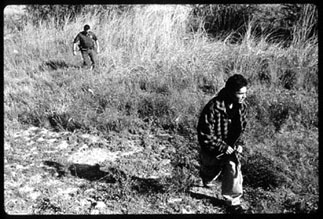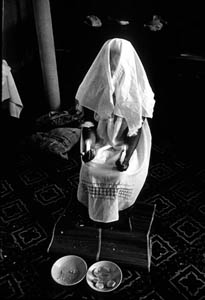
|
|
|
 |
| Nogales, Arizona, 1996. Joseph Rodríguez |
|
GOSPEL From "The
Acts of the Apostles": I. Postborder Cultures A cholo from the Purépecha Plateau in Michoacán strolls down the main street of Nahuatzen, pushing past grandmothers in shawls and peasants in muddy boots. He's wearing his Oakland Raiders cap backwards and his head is shaved East-L.A. style. He's got his Nikes on and his baggy pants. He's wearing a sleeveless T-shirt to display the tragicomic mask tattooed on his shoulder with the slogan "la vida loca." He goes into a video arcade with his buddies and spends an hour killing ninjas, blacks and Arabs. Each time he kills a bad guy he screams: "En la madre, motherfucker!" Then he climbs into his ranfla, a broken-down '79 Datsun with North Carolina plates, and he goes cruiseando through town singing the refrain from a golden oldie: "My angel baby, my angel baby/oooh I love you, yes I do..." At eight o'clock, with the church bells ringing, he heads home, where his grandmother in long traditional braids awaits him. She greets him in Tarasco, the Purépecha language, and this postborder tough guy, with the utmost respect, answers in his ancestral language. They sit in the living room, turn on the Samsung TV hooked up to a satellite dish on the roof, and they spend a couple of hours wachando MTV, CNN and the soap opera "De pura sangre."
Meanwhile, back in Los United States: I know a young Chicano whose folks emigrated from that very same Purépecha Plateau 20 years ago following the lettuce harvest in Watsonville, California, the watermelon harvest in Kentucky, the tobacco harvest in North Carolina, the orange harvest in Florida, then working a bit on the railroad in Nebraska, as room cleaners in a Dallas hotel and, at last, settling down in Southern California where they straightened out their papers and bought a modest home in a San Fernando Valley neighborhood affectionately rebaptized "North Hollywood, Michoacán"-where three generations ago, Mexicans picked oranges and it was neither North Hollywood nor Michoacán. This young man was an outstanding student in high school, loves biology and is now a sophmore at UCLA. He speaks English and Spanish perfectly and can even say a few words in Tarasco. He used to be a fan of death metal and trash, but today he belongs to the Movimiento Estudiantil Chicano de Aztlán (MEChA). He spends every weekend deep in the woods of the Los Padres National Forest, a mountainous area north of Los Angeles where an old Indian from the Chumash tribe teaches Indian traditions to young Chicano radicals and preaches about a spiritual war in which the bronze race will recover its dignity. This Purépecha and very Chicano postrocker goes back home after the sweatlodge ritual and spends a couple of hours with his parents and brothers and sisters watching a bit of MTV, CNN and the soap opera "De pura sangre."
GOSPEL Words from "The Adventures of La Gaby" (scandalously suppressed by Cardinal Ratzinger), the hottest Jalisco transvestite at El Plaza, a Latino gay club on La Brea Avenue at Third Street in Hollywood, California: My love |
|
II. Movement, Agitation, Continuity If we observed the present through the lens of the bullshit past, we'd say that Mexico's previous national identity is once more under attack by free-trading yanqui invaders and that each satellite dish is a direct challenge to the kingdom of her holiness the Virgin of Guadalupe. We'd say Chicanos are a bunch of stupid "pochos" with no right to call themselves Mexicans, and that the narco-cholos of Michoacán are threatening the nationalist spirit of beloved Mexico. We'd say, "What a shame Purépechas watch MTV, CNN and De pura sangre instead of cultivating their patch of corn in bare feet with the tools of antiquity." For those who persist in thinking that a linear border separates what it means to be Mexican, Indian, Mestizo, Chicano, etc., history has passed you by. Those who still cling to the notion of "the spiritual Indian" deny the Indian present: that Indians can be and are as modern as the "postmoderns" from any of the planet's great urban centers. In fact, more Indians live in cities than in the countryside, and an enormous number of Mexican Indians live on the northern side of the border. In other words, the Indians frozen in dioramas in Mexico City's Museum of Anthropology and History that Mestizos so admire, are more inquisitive, more on-the-move and more in touch with modernity than the Mestizos themselves. Indians are the people who work on "the other side" and come back with a new television set and VCR to enjoy the movies of Steven Seagall. Just as Mestizos lament the supposed loss of the Indian past, they see Chicanos and their supposed identity crisis as tragic. But those who see a "loss of Mexicanness" in Chicanos don't know much about themselves. In many ways Chicanos are more "Mexican" than the Mexico City middle class, whose gaze is ever fixed on New York and Paris for the latest chic standard. Middle-class Mestizos have set up a false dynamic. They believe the future lies in the North (in the United States or Europe) and the past in the Purépecha Plateau (or the Lacandona Jungle or the Sierra Tarahumara). The truth is that time and space no longer obey such primitive borders. The future lies on both sides of the border, as does the past, and the present is everywhere: satellite dishes and cholos in Michoacán, neo-Indians and Mixteco soccer teams in California. Everything moves, everything changes, everything remains. It seems that the only ones who feel comfortable in these rough seas are Indians and Chicanos, who understand that the future and the past coexist in the present. More than a loss of identity, what is happening is a continuation of the process of mestizaje in which Indians and Chicanos can put together a cultural package of their own choosing. Culture is an organism that must adapt to new surroundings to stay alive and continue growing. Hence the young Mixtec who lives in Fresno, California and who no longer speaks his native language is still a Mixtec-if he chooses to keep on identifying himself as Mixtec. At the same time, as philosopher Oswald Spengler noted, the landscape also continually adapts to new organisms that emerge: today, gringos consume more salsa than ketchup, to mention a superficial gastronomical fact rather than enumerate the obvious ways in which gringo society increasingly relies-economically, socially and even culturally-upon Latinos in the United States. The future won't necessarily annihilate the past: tradition and novelty can cohabit in the present. In the towns of the Purépecha Plateau, the same house that has a satellite dish pointed at the heavens may belong to a bruja who cures "evil diseases" with herbs and Tarot, or by a trilingual teenager--Spanish, English and Tarasco--who loves the Transmetal as much as pirecuas, the region's traditional music. |
 |
|
To view this process as bad to cultural health is to project an image of Indians as passive victims of history. And that is precisely the worst stereotype created by Mestizos about Indian identity. A few months ago a young activist woman from los United whose parents had emigrated from India arrived in Mexico City. She had one of those strange backpacks that gringos and Europeans like to carry when they go to the Third World (as if they were heading off on safari in search of elephants and aborigines). She thought the capital was awful: "So many white people," she said. So much noise, so many lights, so many buildings, so many cars. Of course she left the city to find the Tzotziles in Chiapas. They have no need for electricity, television sets, or shoes or books, she said excitedly. Indians live au naturel. How cool! Similarly, because of their inferiority complex vis a vis gringos and Europeans, Mestizos from the capital invent myths about Indians in order to feel that they themselves are modern. When a Mexico City mestizo turns nationalist and takes a neo-indigenist stance in front of foreigners, it is the height of hypocrisy. When I first came to Mexico City as an adult, over ten years ago, college teachers and leftists in general treated me paternalistically. Poor Chicano, they told me. In your country you suffer from the scourge of racism. Here in Mexico we have no identity crisis. Give me a fucking break! We Chicanos (or in my case Chicano-Salvadorans born in Los Angeles who now live in Mexico City), a bit like Buddhists, know that stability is a state of movement. To put it simply, these days people who don't move die. Which happens to be the opposite of the motto of the latest operation of the Border Patrol: "Stay out, stay alive" (rhetorically displaying on the border fence the bodies of those illegals drowned in the Rio Bravo or who died of thirst in the desert as they tried to cross). But there are many Mexicans who know that to stay alive is to move. Economically, culturally, linguistically, sexually. Therefore, given what we have affirmed here, we offer
THE PLATFORM OF THE WETBACK PARTY: The problem is not the language we speak nor the accent with which we speak it. The problem here is the Border Patrol. The problem is not being gay, straight, bi or transvestite. The problem is AIDS. The problem is not whether we're Catholics or Pentecostals or Sufis. The problem is lack of tolerance, and the fact that the state, the Catholic Church and other social and economic powers encourage intolerance by promoting the false image of a homogeneous nation. The problem is not street vending or prostitution or drug addiction. The problem is neoliberalism, which leaves many people without any chance to participate economically or culturally in the process of globalization, while it benefits the middle classes of the United States and Europe who so like to dance salsa, eat Thai food and attend the performances of Guillermo Gómez- Peña.
GOSPEL They screwed
us once those assholes |
cont...